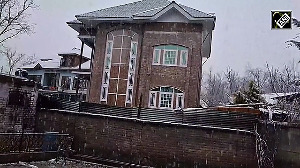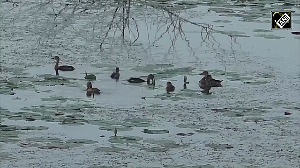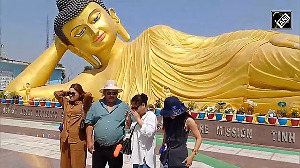Was the prime minister's offer to appear before the public accounts committee a last minute thought or was the offer made under some kind of pressure or duress? This speculation began when the prime minister's speech was circulated to the media as well as the assembled delegates at the Congress plenary session in Burari.
A cursory look at the speech revealed that the telling lines where he says that he has nothing to hide and makes the offer of appearing before the PAC and says that as the prime minister for the last six and a half years he has tried to serve the country to the best of his ability and goes on to add, "I sincerely believe that like Caesar's wife, the prime minister should be above suspicion and it is for this reason that I am prepared to appear before the PAC even though there is no precedent to that effect" were not part of the text of the circulated speech.
An additional page was however stapled at the end of the speech in a bigger type size clearly revealing that it was a last minute insertion after the speech had been readied.
For the last two months, since the government has been consistently under attack on issues of corruption, the prime minister has been quiet and has failed to speak on the issue or clarify his position. A senior leader said that Pranab Mukherjee had a number of meetings with opposition leaders from time to time in a bid to break the impasse and this offer could have been conveyed to the opposition through Mukherjee, even if the prime minister did not want to raise it himself.
With the entire winter session having been washed out, it is interesting that he is now making the offer from the party platform. From the way it appears, there is intense speculation that the offer may have been made under pressure from the party leadership since Sonia Gandhi herself had said earlier that the opposition wants the prime minister to appear before the JPC that is why they insisted upon it.
In his speech, the prime minister also devoted a considerable amount of time and space--quite like party president Sonia Gandhi had done in her opening speech--to countering allegations of corruption. He said that the various charges were being leveled against the party and the government and it is being alleged that "we are not sufficiently sensitive to the issue of corruption". The prime minister said, "It is my promise to you that no guilty person will be spared--whether he is a political leader or a government official, whichever party he may belong to and howsoever powerful he may be". The PM said that if there were shortcomings in the functioning of his government, he would address them so that they could be more effective in tackling corruption.
While the PM opened the second day's discussions at the plenary session with his speech, there was a long and very loud disturbance of more than 10 minutes during his speech. The commotion began when the Congress MP from Bahraich, Kamal Kishore tried to enter the plenary hall but was stopped by the Seva Dal volunteers. This led to a large number of up delegates also joining in with loud shouts, pushing pulling and the matter getting out of control.
What was interesting was during the entire disturbance during which the prime minister continued to speak, neither congress president Sonia Gandhi nor any of the others on the dais including Janardan Dwivedi who was conducting the proceedings made any appeal to the delegates to maintain calm while the prime minister was speaking. They behaved as though there was nothing out of the ordinary in what transpired.
As Sonia Gandhi had devoted a entire paragraph in her speech, praising the prime minister, Dr Manmohan Singh also returned the compliment. He said "it is our good fortune that we have the opportunity to work under Sonia Gandhi's leadership. Her humility, her belief in principled politics, and her deep commitment to making the Congress a strong organisation inspire and empower us."
In her concluding remarks at the close of the plenary, Sonia Gandhi once again went back to the issue of corruption. She said, "We will take the issue of corruption head on and demonstrate through actions and not words that we mean what we say. I had made specific suggestions in this regard and the prime minister has assured us that they will be taken forward".
Sonia Gandhi also told the delegates that they should take on their political opponents aggressively. Implicit in this is an admission that they had been too much on the defensive when there was no need for that. She said the United Progressive Alliance government had achieved a great deal, much more than what was done by the National Democratic Alliance but admitted that they needed to send this message across to the people as well as effectively counter the "blatantly baseless and completely unfounded accusations being leveled by the opposition particularly the BJP."
She has asked the state units to organize a jan jagran abhiyan (public awareness drive) to inform the people of the achievements of the government and to expose the BJP, by having at least one public meeting in each assembly segment and the Pradesh Congress Committees should take the lead in this.









 © 2025
© 2025